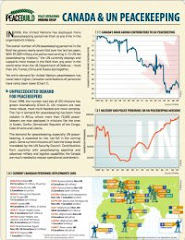Yesterday, Secretary-General Ban Ki-moon appointed an experienced female Swedish police officer as the top United Nations police official.
“The UN’s top cop is a woman,” Mr. Ban told reporters in New York, noting that today’s announcement of Ann-Marie Orler as UN Police Adviser coincides with International Women’s Day.
Ms. Orler, who first came to the UN to serve as Deputy Police Adviser in 2008, has been Acting Police Adviser since last year.
In her native Sweden, she served as the Secretary General of the non-governmental organization (NGO) Amnesty International and was also the Police Commissioner in the town of Västmanland.
On the international stage, she has worked as the Programme Manager for Police and Human Rights with the Council of Europe, where she took part in fact-finding missions and trained police officers in Turkey and several Balkan nations, among others.
The Secretary-General today hailed her work in leading “the global effort to recruit more female police officers for UN peace operations.”
At present, there are nearly 13,000 UN Police (UNPOL) – more than 6 per cent of whom are women – from some 100 countries who working in 17 different field missions.
One of her top priorities in her new role as the UN’s top police official will be to enhance the participation of female police officers so that the comprise 20 per cent of all UNPOL in peacekeeping by 2014, Ms. Orler said at a press conference today at UN Headquarters.
She pointed to the role played by the all-female Formed Police Units (FPUs) – comprising police officers trained in dealing with high-risk operations – in Liberia who have helped to “improve the status” of Liberian women police officers.
“As the world has become a global village, there is no doubt that the concept of policing must reflect the same universal values and principles,” Ms. Orler underscored.
Most of the conflicts around the world are a result of challenges to the fundamental social, economic and political rights of all people, she said, stressing that upholding these rights is a top priority.
To adapt to the shifting nature of conflict, “our engagement has also gone through a major evolution,” Ms. Orler noted. “From a passive monitoring role in the early days, we have proactively undertaken executive policing, supported national police in their law and order functions, and help reform, rebuild and restructure the host national police services.”
Each mission has its own unique challenges, said the new Police Adviser, who recently visited Haiti and saw first-hand the efforts of UNPOL to help the impoverished Caribbean nation recover after being struck by a devastating earthquake in January.
The challenges facing the country, she said, are three-fold: dealing with the immediate aftermath of the earthquake; helping the Haitian National Police (HNP) back on its feet to resume providing security; and to boost the country’s justice system.
Ms. Orler also detailed the efforts of UNPOL in other areas, such as the war-torn Sudanese region of Darfur, as well as the Democratic Republic of the Congo (DRC) and Timor-Leste.
She said that she looks forward to taking on the role of Police Adviser in a time of numerous challenges, “but also a time of action, opportunities and change,” highlighting the importance in partnerships to use resources most effectively and improve justice systems.
UN News Centre
Tuesday, March 9, 2010
Friday, March 5, 2010
Peacekeepers to Withdraw From Parts of Congo
UN Photo/Marie Frechon

New York Times
By JEFFREY GETTLEMAN and JOSH KRON
NAIROBI, Kenya — The United Nations will begin withdrawing peacekeeping troops from Congo by June to hand control of the country’s security back to the Congolese, officials with the United Nations mission to Congo said Thursday.
The officials said they would still keep thousands of troops in Congo’s troubled east, where a toxic mix of armed groups continue to brutalize the population. But the peacekeepers will soon pull out of the more stable areas in the central part of the country.
Pressure has been building for months for the United Nations to find an exit strategy, with President Joseph Kabila eager to solidify his control before elections next year.
Read the full article

New York Times
By JEFFREY GETTLEMAN and JOSH KRON
NAIROBI, Kenya — The United Nations will begin withdrawing peacekeeping troops from Congo by June to hand control of the country’s security back to the Congolese, officials with the United Nations mission to Congo said Thursday.
The officials said they would still keep thousands of troops in Congo’s troubled east, where a toxic mix of armed groups continue to brutalize the population. But the peacekeepers will soon pull out of the more stable areas in the central part of the country.
Pressure has been building for months for the United Nations to find an exit strategy, with President Joseph Kabila eager to solidify his control before elections next year.
Read the full article
Thursday, March 4, 2010
The Peace Operations Monitor (POM) has been updated and revamped
The POM has a new look and updated information on all three missions (Haiti, Sudan, Afghanistan). The Peace Operations Monitor is a source of information about the mandates, multifaceted composition, structures, performance and challenges of UN and other peace operations.
Go to the site
Wednesday, March 3, 2010
New Research Paper: Whatever Happened to Peacekeeping? The Future of a Tradition
This ground-breaking report by the Canadian Defence & Foreign Affairs (CDFAI) Institute urges Canada to reconsider and rejoin UN peace operations. The authors Jocelyn Coulon and Michel Liégeois, PhD argue that peace operations in the twenty-first century are different from those in the period between 1950 and 2000 and that with clearly understood terms of reference, Canada should return its Forces to UN operations when such missions are judged to be in our national interests.
Backgrounder Full Article
Consulter l’étude en français
Backgrounder Full Article
Consulter l’étude en français
Subscribe to:
Posts (Atom)







